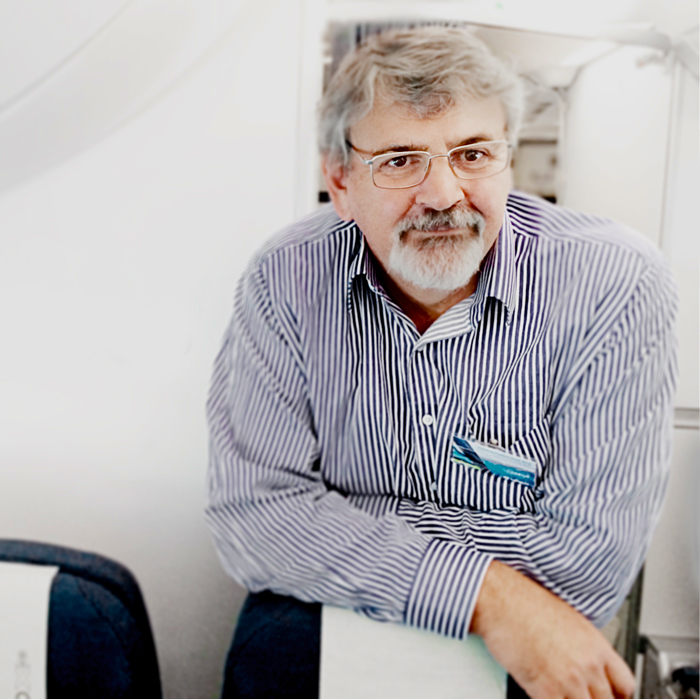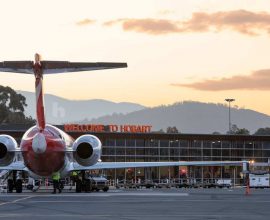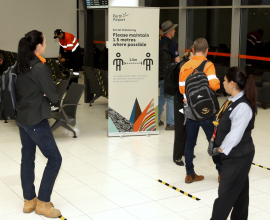NT Airports harnesses business clout to promote growth
Airports who want to exert an influence in their regions would do well to emulate an initiative started in Darwin, according to Northern Territory Airports chief executive Ian Kew.
Kew was watching the Territory’s economy soften as tourism stagnated and the resource boom ended when he decided it was time to take action.
His initial thought was a group designed to share useful and relevant information between major companies.
NT Airports is a key player in the Top End with facilities in Darwin, Alice Springs and Tennant Creek. It directly and indirectly generates about 1800 jobs, handles more than 2.4 million arriving, departing and transit passengers and contributes some 1.5 per cent of the Territory’s gross state product.
Other businesses were interested in the passenger data collected by the airport and Kew was keen to know about trends in consumer confidence, retail spend, hotel rooms and freight.
But the information sharing idea quickly developed into forming a group to look at projects, issues and policies seen as important to the region.
“It was originally an idea to share information but now it’s more an idea about how we can collectively get together, understand what things we think are important and hopefully influence all levels of government,” says Kew.
Enter the Darwin Major Business Group, a collective of 14 major private and public companies representing diverse interests and about 11 per cent of non-government, non-military gross state product.
The companies employ about 4500 direct and indirect employees and spend between $400m and $500m in capital each year.
The group formed at the start of this year and Kew says it has worked well with the new NT government.
Members participated in an economic summit organised by the incoming Gunner government and presented a range of projects and policy changes that could benefit businesses and the economy.
“What we wanted to do was engage with government collectively on the things we can and should talk about together and get them to start doing some of the things that we think will make a difference,’’ Kew says.
A common link, according to Kew, is that all of the businesses are “captive to the prosperity of Darwin and the Northern Territory’’.
“I can’t pick up the airport and shift it somewhere else because times are bad,’’ he says. “Whereas if I was a developer I could stop spending money and go and spend it in Canberra or Sydney.’’
The aim, says Kew, is to convince the government “to get things done’’. This means the introduction of policies that will generate investment and growth as well as projects that will make a difference to the economy.
He cities tourism and the visitor economy as a key example, noting it is essential to destinations such as Alice Springs and Uluru.
Ironically, the construction of the INPEX giant gas project Impex has distorted the tourism industry in Darwin by boosting the price of hotel rooms and air fares.
“They’re spending $US14 billion plus on the ground here in Darwin,’’ he says. “We thought we would have all of that growth on top of our normal business.
“But what it’s done is just displaced the leisure market and the VFR market.”
The good news is that Kew expects this to turnaround when the project finishes in a year or two.
What he wants is for governments, business and community to start working together now through projects such as the vibrant and unique annual Darwin Festival, which he chairs, to build up what is currently a relatively small visitor economy.
“We will end up with probably with pretty cheap airfares and pretty cheap hotels,’’ he says.
“What we’re saying to the government is we need to really build on tourism product because we think that’s a great opportunity. But you have to do it now.’’
A unique event organised by the group was a “Facing North” function held earlier this year at Parliament House in Canberra.
This was based on similar events organised by Australian Airports Association (AAA) Chief Executive Caroline Wilkie for airports and tourism and aimed to open up lines of communications between local interests and federal politicians.
Kew’s view was that the Darwin business needed to work with the territory government to engage Canberra politicians, probably half of whom had never been to the Territory, and make them aware of The Top End’s potential in conjunction with the territory government.
“It was a real partnership and, indeed, it was a great bipartisan event,’’ he says. “It was the first time, they said down there, that business and a state or territory government had come hand-in-hand like that, together, to engage with federal parliament.
“Over 300 people came. It was great success and probably something I’m sure we’ll now turn into an annual event.’’
Kew thinks there are lessons for other airports in the Darwin experience, particularly the bigger regional facilities.
“What it’s really shown us, and me in particular, is just how important the airport is to the community,’’ he says, adding that airports have the clout to get things done and galvanise other businesses to work together.
“I think doing things on your own is hard work but if you get around the table you find many of you are thinking exactly the same thing on different issues,’’ he says
“And I think governments really appreciate dealing with a group that has some horsepower in it, the will to get things done and the capacity to do so.”
By Steve Creedy
About Steve Creedy
 An award-winning journalist, Steve began covering aviation in the United States in the early nineties before returning to Australia later that decade and editing The Australian’s aviation section for 17 years. He is editor of Airline Ratings and has co-authored books on industry initiatives aimed at reducing greenhouse emissions.
An award-winning journalist, Steve began covering aviation in the United States in the early nineties before returning to Australia later that decade and editing The Australian’s aviation section for 17 years. He is editor of Airline Ratings and has co-authored books on industry initiatives aimed at reducing greenhouse emissions.
Steve has joined the AAA to write interesting and informative editorial on the aviation industry.





